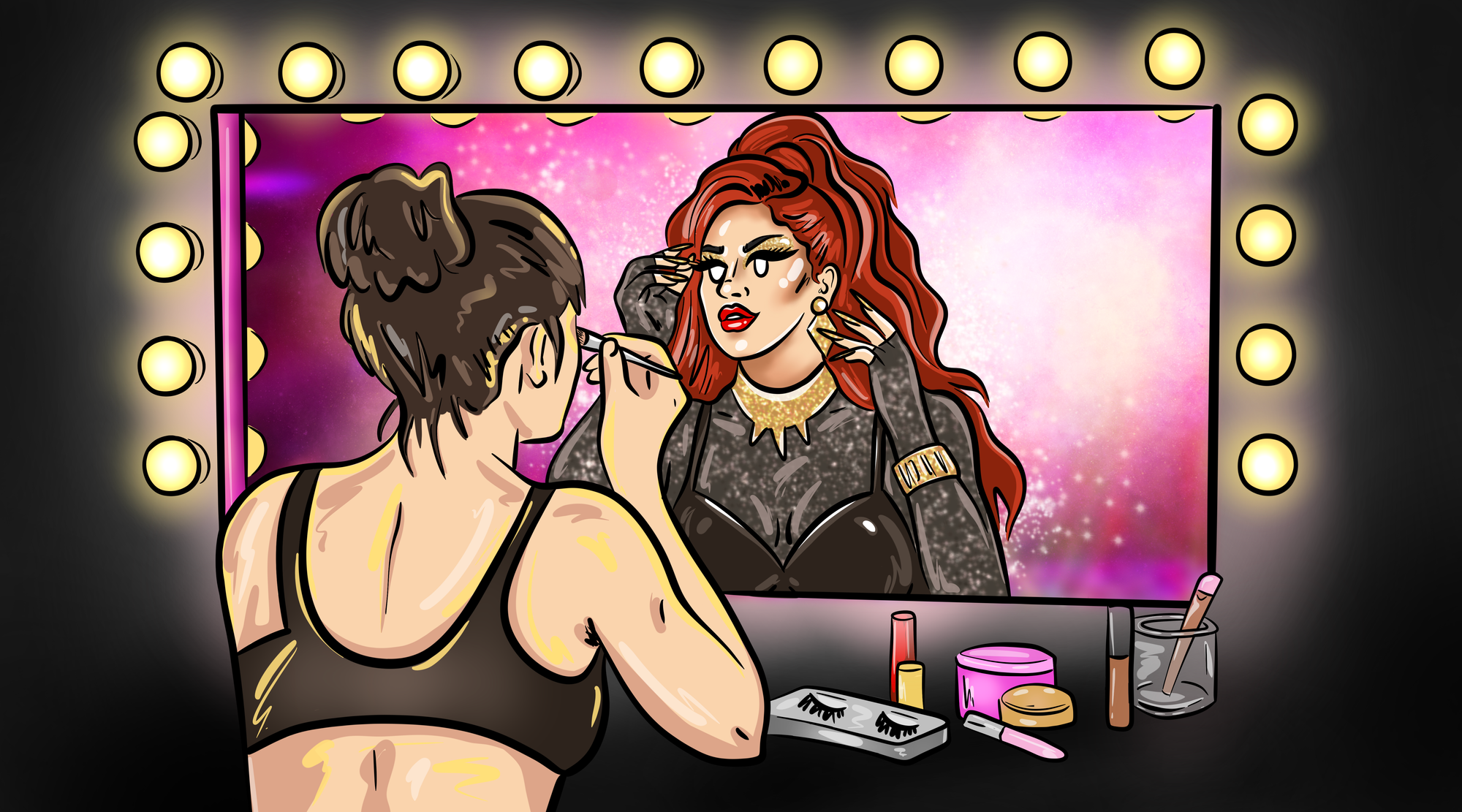“Oh yeah, I know lots of sex workers.”
It’s a line I’ve heard many times when meeting a non-worker for the first time. We’ve usually only just begun the conversation. You know, the “what do you do?” kind of small talk that we might share at a friend’s house or before a meeting. Because I’m lucky enough to be completely ‘out’ about my work, I make sure to bring it up early. More often than not, “I know so many sex workers!” is their response.
Now, I’m realistic. I know that much of the world has no real idea about the sex industry. You may think that I’d find this kind of response reassuring, but it’s usually a bad sign.
Rather than asking about me, or the kind of work I do, the person I’m talking to launches into a defensive rant about how comfortable they are with the idea of swapping sexual services for money. But I can tell it’s an act! They’re talking fast, shuffling their feet anxiously, and completely forgetting to actually ask me anything else about myself. It warns me that, although they desperately want to look like an ally, they’re not quite there. It just doesn’t feel genuine.
I’m lucky to have many sex-positive friends who are totally chill about what I do, but that’s not always the situation. Even when many of our allies” think they’re helping, it often becomes more about making them feel comfortable about how much they don’t know, or helping them boost their street cred. These kinds of gaffes widen the gap between us, and create more awkwardness.
I’d like to to explore the difference between bragging about your sex work knowledge and actually being a good ally. Here are a few situations you might want to handle carefully, and some tips for making sure you’re helping, and not making yourself look like a bit of a tool.
I’d like to to explore the difference between bragging about your sex work knowledge and actually being a good ally.
This stuff applies to every non-worker who talks about sex work or interacts with providers. Whether you’re a partner, friend or family member of a worker, a client who wants to do the right thing, or simply someone who cares about sex worker rights – some of these situations will be relevant for you. Whether you’re talking to others in person, posting on social media, or chatting with your date during a sex work session, I think some of this might come in handy.
“I’m friends with lots of sex workers.”
Let’s revisit that dreaded line I mentioned above. Say you’ve just met someone at a party, or a pub maybe. You’ve started chatting, and they’ve just told you they’re a sex worker. What do you say next?
Someone ‘outing’ themselves to you as a pro is a really big deal. Often, it can feel fraught and nerve-wracking to disclose that I’m an escort. I’m never sure how it will be received, and I’m hoping for some reassurance that I’ve made the right decision in trusting you.
Talking about how many sex workers you already know isn’t as reassuring as you might think. Even though you may know other people who do my job, it doesn’t give me any information about how well you treat them or what you think of them. It feels depersonalising – like, sure, you know lots of workers, but you don’t know me!
The line “I have [insert minority] friends!” is sometimes used as a fallback by people when they’re called out on inappropriate comments or behaviour. It can’t be racist/sexist/whorephobic if you’re mates with some of the people you’re maligning, right? Anyone who’s had this argument used against them in the past might be wary when they hear it in casual conversation, regardless of your intentions.
Even though you may know other people who do my job, it doesn’t give me any information about how well you treat them or what you think of them.
You don’t need to go to great lengths to prove you’re okay with my work. All you need to do is avoid making a big deal out of it. I don’t need your commentary, or your approval. I just need you to say, “yeah, awesome” or “thanks for telling me”. Treating me like a normal person is proof enough.
“My partner/friend/workmate is a sex worker.”
I had a friend when I was in my twenties who had a mate that was a stripper. How did I know this? Because he brought it up over and over. To this day, I’m not sure if he ever actually told us her name.
Sure, sex workers are hella cool, and you may feel chuffed to have someone in your life who strips, escorts, or cams. But you need to be very careful how you talk about this, and to whom. Aside from being a huge breach of privacy, it can also end up looking like a bit of a desperate grab for street cred.
I can empathise with this particular dilemma. If you’ve just started dating someone who does sex work, you might feel so tempted to bring it up when enthusing about how great your new person is. There are definitely circles where knowing– and especially dating – a sex worker will give you a bit of extra social credibility. It can be hard to resist this call!
Please, hold back. Disclosing sex work is a very personal situation. A provider might come to great harm if they’re outed to friends or family. Even those of us who are lucky enough to be open about our work may not be “out” in certain social settings, depending on who’s present. It’s a complicated risk assessment that only that individual sex worker can make.
If I hear you talking about your friend/girlfriend/etc being a provider, I’m immediately wary. Has that person given you permission to “out” them? And if they haven’t, do I need to worry that you’ll do the same to me? Unless you can openly and honestly answer these questions within seconds of your disclosure, it’s best not to bring it up at all.
Disclosing sex work is a very personal situation. A provider might come to great harm if they’re outed to friends or family.
There are some times where it’s useful to brag about your industry social circle. For example, when you’re standing up to be counted (“I see sex workers and they’re awesome!”) or when you’re clapping back against a radfem or anti (‘I know lots of sex workers and they’ve all told me that decrim is the only way to go.’) In those cases, the goal is advocacy, not street cred, and you’re not singling out anyone specific.
"I’m only trying to help."
When a sex worker you know is having a bad time, are you listening and supporting? Or are you white-knighting? The first option is great, the second, not so much.
I understand that it can be distressing when a worker friend has a bad day. Perhaps it’s a favourite provider of yours who is complaining about being banned on social media. Maybe an escort friend just had an encounter with a client who treated them disrespectfully. Or your partner is questioning their sex industry job and wondering if it’s time for a change, as can happen with any career.
“White-knighting” refers to the act of rushing in to save someone without asking them what they actually need. When a sex worker talks about their troubles, you may feel tempted to throw them over your proverbial horse by saying things like, “You should stop doing this job, it’s bad for you.” Or, “I’m going to lend you some money so you can quit.”
It feels like helping, but it’s not. Here’s why.
Firstly, you’re assuming you know what we need better than we do. Sex work is a very specialist kind of job, and it’s pretty much impossible to understand it fully unless you’ve actually done the work. Your well-intended advice is likely something we’ve already tried, or something completely impractical. Being “problem-solved” in this way is frustrating – and it’s a waste of our time.
When a sex worker talks about their troubles, you may feel tempted to throw them over your proverbial horse by saying things like, “You should stop doing this job, it’s bad for you.”
Secondly, you’re disempowering us by implying we’re not capable of managing our own problems. Why would we quit a stable job in the sex industry, if that means not being able to pay the rent? How do you know whether we’re happy in our work or not, overall? These are big choices, and they’re ours alone to make.
Lastly, there’s the stigma problem. People who work in cafes, behind the counter in banks, or in cramped offices often don’t receive the same level of critique when they have a bad day. When things aren’t going right, it’s just considered a normal part of life. On the other hand, a sex worker’s bad day is often treated as “proof” that the whole industry is inherently harmful. When you leap to “just quit” as a solution, you’re showing me that you’re judging me and my work too.
So, what to do instead? Learn to listen and empathise. Sometimes it’s all that’s required! You might also want to reinforce the idea that we’re the experts in ourselves by asking, “What do you feel are good next steps for you?” And if you’re completely at a loss, it never hurts to ask, “How can I best support you?”
Being a good friend really is just about holding space, and letting us be ourselves.
“You should know better.”
Here’s one for those who like to jump into sociopolitical arguments – allies who don’t mind a bit of verbal sparring, and are eager to stand up for what they believe in. If you’re one of these people, you doubtless know that a lot of the negative stuff others say about sex work is utter garbage. And you’re ready to call it out.
Advocating for sex workers is super important. But please, if you can, do it compassionately.
When people trash-talk the sex industry, it’s tempting to verbally slap them down, tell them off, or call them out. This is especially true on social media, where it can feel very satisfying to rage against someone who’s said something stupid or hateful. It shows you’re not one of those people, right? And you’ll probably get at least a few likes from people who share your views. But are your words making a difference?
You doubtless know that a lot of the negative stuff others say about sex work is utter garbage. And you’re ready to call it out.
Lecturing isn’t always the most effective strategy. Sometimes, the people who parrot this garbage are ignorant, and a few sensible words can help steer them back in the right direction. Or, if you’re dealing with a hardcore anti-sex-work activist, offering helpful pointers and countering their arguments rationally can help convince other people who may be listening in. These kinds or conversations are difficult because they require forethought, compassion, and a library of good reference material. It’s a lot harder to craft a calm rebuttal than to tell someone they’re an asshole. But it does sometimes help.
Sex workers themselves might not always have the emotional bandwidth to address the ignorant comments of others patiently, because it’s happened to us so often, and we’re so damn tired. Negative comments against sex workers can feel personally invalidating and awful. It really takes a toll on us, but, as a non-worker, you have the privilege of not being triggered. So don’t. Do the emotional labour – that work of gently educating others – so sex workers can do it less.
The most important question is...
Are you really helping, or is this more about making yourself feel good?
Sex work is an incredibly stigmatised profession and our allies don’t always get it right. Sometimes the people around me think they’re advocating, but really they’re just trying to cement themselves into my social group, or make themselves feel better about what they don’t know.
Name-dropping, white-knighting, and virtue-signalling don’t help sex workers – we need real action from allies who’ve done their homework. If you want to be effective, you need to be able to pick up on when you can speak up to advocate effectively, and the times you’re tempted to speak up just to make yourself feel better.
Once you get this right, you’ll be able to make a huge difference.
Are you a sex worker with a story, opinion, news, or tips to share? We'd love to hear from you!
We started the tryst.link sex worker blog to help amplify those who aren't handed the mic and bring attention to the issues ya'll care about the most. Got a tale to tell? 👇☂️✨





